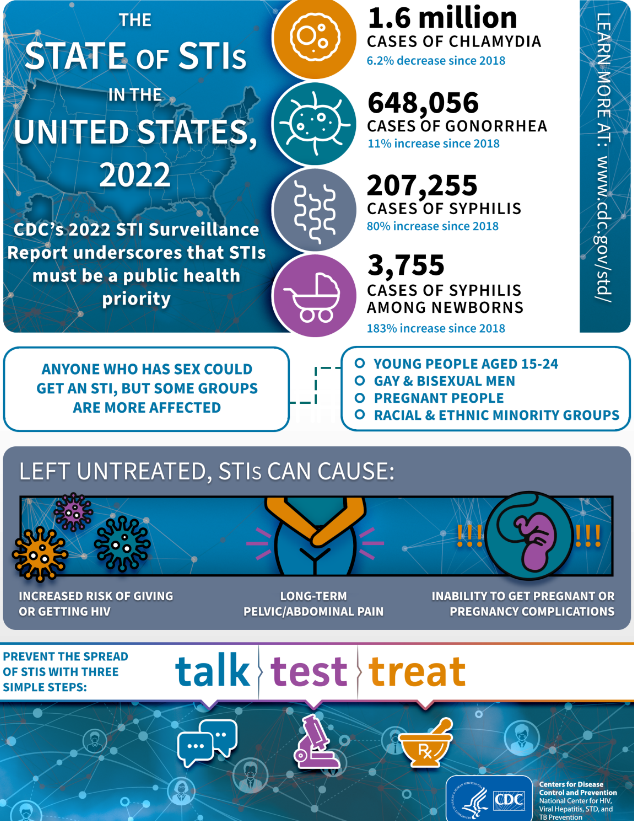In 2022, more than 2.5 million cases of syphilis, gonorrhea, and chlamydia were reported in the United States. There were alarming increases in syphilis cases in particular – there has been an 80% rise in syphilis cases since 2016 and in 2022, there were 3,755 cases of syphilis among newborns reported (163% increase since 2018). While sexually transmitted infections (STIs) occur in all populations, some groups are more affected, including young people, gay and bisexual men, transgender individuals, and pregnant people. There are deep inequities in the rates of STIs including disproportionate rates among racial and ethnic minorities which are the result of longstanding social and economic structural inequities.
Sexual health services are being threatened and have inequitable resources which further complicates care for those individuals with lived experience with STIs, HIV, and viral hepatitis. They often experience additional and intersecting sexual health, behavioral health, and social needs that must be addressed concurrently.

HMA brings together experts from a full spectrum of sexual health services including policy, clinical, operations, and research.
Our experts have significant experience with conducting needs assessments and gap analyses, supporting syndemic (HIV/STI/Hepatitis) planning, centering health equity, and leveraging policy and research findings to maximize impact and access. A syndemic is a situation in which two or more interrelated biological factors work together to make a disease or health crisis worse.
Illustration from the Centers for Disease Control and Prevention (CDC)
We work with clients to reach shared goals of supporting sexual health, expanding access to screening, vaccines and other preventative services, reducing high rates of STIs including HIV, and addressing deep and persistent racial disparities in STI rates and the inequities that drive them.
We can help organizations including:
State and municipal departments of health and public health
Health plans
Community-based organizations (CBOs)
Behavioral Health Service Organizations
Federally Qualified Health Centers
Title X Clinics
Planned Parenthood affiliates and other free-standing women’s health centers
Foundations
Associations and Coalitions
Our sexual health experts include:
Former senior officials from the Health Resources and Services Administration and the Center for Disease Control and Prevention.
Advocates and former senior leaders of community-based organizations, foundations, and other programs that support healthcare systems capacity to implement quality STI prevention, screening, diagnosis, surveillance, and treatment.
Clinicians with experience providing sexual health services and building programs at the intersection of sexual health, behavioral health, primary care and maternal and child health.
Social workers and behavioral health professionals working to integrate approaches that address social and behavioral health needs.
Program development, strategic planning, and technical assistance experts working to implement innovative solutions and evidence-based guidelines.
Researchers and evaluators with extensive experience examining the implementation and impact of policy and operational changes on sexual health services.
Our experts can support your work to expand equitable access to sexual health care.
With offices in more than 30 locations across the country and over 700 multidisciplinary consultants with a wide spectrum of industry experience, and longstanding expertise in all 50 states, HMA has experienced staff in syndemic needs assessments and planning, program evaluation, research and analysis, strategic/business planning, clinical services, stakeholder engagement, quality improvement, and workforce development. Our portfolio of companies also gives you access to actuarial, data analytics and communications expertise, and more.
OUR WORK
South Carolina Department of Health and Environmental Control (DHEC) contracted with HMA to conduct a statewide gap analysis to document the array of partner services and disease intervention STI inside and outside the department and identify gaps and duplication to improve services and strengthen the program. As part of this engagement, HMA conducted an analysis of South Carolina’s STI delivery system, staffing capacity and processes, and developed a service location map to highlight gaps and inequities. The final report summarized findings and included recommendations for closing gaps in service delivery, workforce development and improving the efficiency and effectiveness of service delivery.
HMA supported the Washington State Department of Health’s Office of Infectious Disease in taking a syndemic approach to ending the HIV, STI, and viral hepatitis epidemics. A key activity of this project included supporting the Office of Infectious Disease to establish a new planning body that reflects the populations served by transforming their Statewide HIV Planning Group and launching a new communicable disease (syndemic) planning group. This work included conducting research on other statewide planning group structures, collecting community and stakeholder input, developing and operating structure, charter, and bylaws; recruiting and onboarding a diverse membership; and creating organizational change management, all with a focus and commitment to advancing racial equity. Through this work, HMA also drafted the state’s integrated HIV Prevention and Care Plan and Requests for Applications to help distribute state funds to local intervention efforts that advance the goals of this plan.
As part of our extensive area of work in strategic planning with state and local agencies, providers of health and human services, community-based organizations and many more, HMA has worked with clients that provide sexual and reproductive health care services to assess potential opportunities and approaches for expansion, delivery, and financing of care to reach underserved communities.
HMA worked with the Wyoming State Department of Health to conduct their HIV needs assessment and developed their Integrated HIV Prevention and Care Plan. This work included collecting and analyzing data on HIV incidence and prevalence; developing HIV, STI, and viral hepatitis ecosystem maps; facilitating workgroup meetings; collecting additional community and stakeholder input through provider and community surveys and focus groups; and developing a written report of the assessment findings, all with a focus and commitment to advancing health equity.
HMA worked closely with the Boston Public Health Commission to conduct an extensive HIV needs assessment. Activities included key stakeholder interviews, focus groups, surveys and data collection and analysis. Emphasis was placed on the intersection of HIV and drug user health.
HMA team members developed and implemented professional development training series entitled “The Intersection of HIV and SUD” on behalf of the Minnesota Department of Health. The 12-hour curriculum was developed in partnership with several community organizations representing Tribal, African American, and LGBTQIA+ communities. The training is delivered virtually and includes topics such as: understanding HIV; HIV risk reduction; SUD harm reduction; chemsex; HIV and stigma, pregnancy and HIV; and cultural, racial and sexual identities.
Contact our experts:

Julie Rabinovitz
Principal

Charles Robbins
Principal
